- Home
- Barbara Kingsolver
Animal Dreams: A Novel
Animal Dreams: A Novel Read online
Animal Dreams
A NOVEL
BARBARA KINGSOLVER
in memory of Ben Linder
AUTHOR'S NOTE
Grace, Arizona, and its railroad depot are imaginary, as is Santa Rosalia Pueblo, although it resembles the Keresan pueblos of northern New Mexico. Other places, and crises, in the book are actual.
I'm grateful for the example provided by many nonfictional volunteers from the United States who went to live and work for a new social order in Nicaragua during the decade following the 1979 revolution. Alongside the Nicaraguan people, they have made indelible contributions to that country, and to history.
For their support and contributions to this book I also owe a warm debt of thanks to my editor at Harper & Row, Janet Goldstein, my literary agent, Frances Goldin, and my remarkable family, especially Jessica Sampson (locomotive engineer extraordinaire), Wendell and Ginny Kingsolver, Joe Hoffman, and Camille Hoffman Kingsolver, who has attached me securely to this world.
CONTENTS
AUTHOR'S NOTE
HOMERO
1. The Night of All Souls
COSIMA
2. Hallie's Bones
HOMERO
3. The Flood
COSIMA
4. Killing Chickens
5. The Semilla Besada
6. The Miracle
7. Poison Ground
8. Pictures
9. The Bones in God's Backyard
HOMERO
10. The Mask
COSIMA
11. A River on the Moon
12. Animal Dreams
HOMERO
13. Crybabies
COSIMA
14. Day of the Dead
HOMERO
15. Mistakes
COSIMA
16. Bleeding Hearts
17. Peacock Ladies at the Cafe Gertrude Stein
18. Ground Orientation
19. The Bread Girl
HOMERO
20. The Scream
COSIMA
21. The Tissue of Hearts
22. Endangered Places
23. The Souls of Beasts
24. The Luckiest Person Alive
25. Flight
26. The Fifty Mothers
HOMERO
27. Human Remains
COSIMA
28. Day of All Souls
About the Author
Praise
Other Books by Barbara Kingsolver
Copyright
About the Publisher
HOMERO
1
The Night of All Souls
His two girls are curled together like animals whose habit is to sleep underground, in the smallest space possible. Cosima knows she's the older, even when she's unconscious: one of her arms lies over Halimeda's shoulder as if she intends to protect them both from their bad dreams. Dr. Homer Noline holds his breath, trying to see movement there in the darkness, the way he's watched pregnant women close their eyes and listen inside themselves trying to feel life.
A slice of white moon from the window divides their bodies deeply into light and shadow, but not one from the other. No light could show where one body ends and the other begins when they're sleeping like this. Maybe a mother's eye could tell, but that is the one possibility that can't be tried.
Halimeda's bed is still made. In the morning she'll rumple it so he'll believe she slept by herself, and then the girls will make it again. Their labors at deceiving him are as careful as surgery. But morning is worlds away now, it's still early night on the Day of All Souls. The two of them spent the whole day playing in the cemetery with neighbor children, Pocha and Juan Teobaldo and Cristobal and the twin babies, helping Viola Domingos build a bower of marigolds over the grave of a great-grandmother who is no part of this family.
For a long time he stands gripping the door frame, which is exactly the width of a newborn's skull and curves similarly against his palm. He watches his daughters, though there's nothing to watch, and thinks these words: "A great-grandmother who isn't their business." He decides this will be their last year for the cemetery and the Day of All Souls. There are too many skeletons down there. People count too long on the oblivion of children.
They're deep in the corpselike collapse that takes hold of children when they are exhausted, but still he won't risk going in to stand over the bed the way he once would have. He would see the usual things: unraveled braids and the scraped shins hidden from his punishing antiseptics. Tonight he would also see cheeks and eyelids stained bright yellow from marigold pollen. He's spent a lifetime noticing small details from a distance. From the doorway he smells the bitterness of crushed marigold petals on their skin.
There is a deeper draft of breath and they both move a little. Their long hair falls together across the sheet, the colors blending, the curled strands curving gently around the straight. He feels a constriction around his heart that isn't disease but pure simple pain, and he knows he would weep if he could. Not for the river he can't cross to reach his children, not for distance, but the opposite. For how close together these two are, and how much they have to lose. How much they've already lost in their lives to come.
COSIMA
2
Hallie's Bones
I am the sister who didn't go to war. I can only tell you my side of the story. Hallie is the one who went south, with her pickup truck and her crop-disease books and her heart dead set on a new world.
Who knows why people do what they do? I stood on a battle-ground once too, but it was forty years after the fighting was all over: northern France, in 1982, in a field where the farmers plow blades kept turning up the skeletons of cows. They were the first casualties of the German occupation. In the sudden quiet after the evacuation the cows had died by the thousands in those pastures, slowly, lowing with pain from unmilked udders. But now the farmers who grew sugar beets in those fields were blessed, they said, by the bones. The soil was rich in calcium.
Three years later when my sister talked about leaving Tucson to work in the cotton fields around Chinandega, where farmers were getting ambushed while they walked home with their minds on dinner, all I could think of was France. Those long, flat fields of bonefed green. Somehow we protect ourselves; it's the nearest I could come to imagining Nicaragua. Even though I know the bones in that ground aren't animal bones.
She left in August after the last rain of the season. Summer storms in the desert are violent things, and clean, they leave you feeling like you have cried. Hallie had never left me before. It was always the other way around, since I'm three years older and have had to do things first. She would just be catching up when I'd go again, swimming farther out into life because I still hadn't found a rock to stand on. Never because I wanted to leave. Hallie and I were so attached, like keenly mismatched Siamese twins conjoined at the back of the mind. We parted again and again and still each time it felt like a medical risk, as if we were being liberated at some terrible cost: the price of a shared organ. We never stopped feeling that knife.
But she went. And true to the laws of family physics, the equal and opposite reaction, I was soon packed up too and headed north-east on a Greyhound bus. In our divergent ways, I believe we were both headed home. I was bound for Grace, Arizona, where Hallie and I were born and raised, and where our father still lived and was said to be losing his mind. It was a Sunday. I had a window seat, and in a Greyhound you're up high. You pass through the land like some rajah on an elephant looking down on your kingdom, which in this case was a scorched bristling landscape and the tops of a lot of cars. It wasn't all that different from my usual view of life, because I'm tall, like my father and Hallie. I don't look like who I am. They do, but I don't.
It was m
idmorning when I stepped down off the bus in Grace, and I didn't recognize it. Even in fourteen years it couldn't have changed much, though, so I knew it was just me. Grace is made of things that erode too slowly to be noticed: red granite canyon walls, orchards of sturdy old fruit trees past their prime, a shamelessly unpolluted sky. The houses were built in no big hurry back when labor was taken for granted, and now were in no big hurry to decay. Arthritic mesquite trees grew out of impossible crevices in the cliffs, looking as if they could adapt to life on Mars if need be.
I was the only passenger getting off. The short, imperious bus driver opened the baggage door and made a show of dragging out luggage to get to mine, as if I were being difficult. A more accommodating woman, he implied, would be content with whatever bags happened to be right in front. Finally he slapped my two huge suitcases flat out in the dust. He slammed the doors and reclaimed his throne, causing the bus to bark like a dog, leaving a cloud of exhaust in the air, getting the last word, I suppose.
The view from here was orchards: pecan, plum, apple. The highway ran along the river, dividing the orchards like a long, crooked part in a leafy scalp. The trees filled the whole valley floor to the sides of the canyon. Confetti-colored houses perched on the slopes at its edges with their backs to the canyon wall. And up at the head of the canyon was the old Black Mountain copper mine. On the cliff overlooking the valley, the smelter's one brick smokestack pointed obscenely at heaven.
I dragged my bags to the edge of the street. Carlo, my lover of ten years, whom I seemed to have just left, would be sending a trunk from Tucson when he got around to it. I didn't own very much I cared about. I felt emptied-out and singing with echoes, unrecognizable to myself: that particular feeling like your own house on the day you move out. I missed Hallie. Carlo, too--for the lost possibilities. At the point I left, he and I were still sleeping together but that was all, just sleeping, with our backs touching. Sometimes Hallie would cough in the next room and I'd wake up to find my arm over his shoulder, my fingers touching his chest, but that's only because it takes your sleeping self years to catch up to where you really are. Pay attention to your dreams: when you go on a trip, in your dreams you will still be home. Then after you've come home you'll dream of where you were. It's a kind of jet lag of the consciousness.
Carlo loved Hallie. When he and I moved back to Tucson the three of us contrived a little household in a bad neighborhood, with jade plants on our front steps that kept getting stolen till Hallie thought to bolt down the pots. We played house to beat the band. Hallie and I made prickly-pear jelly, boiled and strained and poured blood-red into clean glass jars. We'd harvested the fruits from the physical therapy garden of the hospital where Carlo worked. A nun saw us out there with our grocery sack while she was walking an old man around the little race track, and Hallie and I just waved. We said we were living off the land.
Our home fell apart when she left. She was our center of gravity, the only one of us who saw life as a controllable project. Carlo was an orphan like me. We forgot about the jade plants, they went crisp as potato chips out on the porch, and Carlo withered as if he needed water also. Every man I'd ever loved had loved Hallie best and settled for me. It didn't bother me as much as you might think; I could understand it. I loved her too.
And now his life with the Noline women had run its course. He could go where he pleased. Carlo was a rolling stone: an emergency-room doctor, which gave him a kind of freedom almost unknown to the profession. You can always find work if you're willing to take up with a human body as soon as possible after one of life's traumas has left off with it. Carlo and I met in medical school, and in our years together he and I probably had more addresses than the Grace, Arizona, phone book, Along the way I'd landed a few presentable jobs, but in between I tended to drift, like a well-meaning visitor to this planet awaiting instructions. My career track had run straight down into the weedy lots on the rough side of town. It's the truth, For the last six months in Tucson I'd worked night shift at a 7-Eleven, selling beer and Alka-Seltzer to people who would have been better off home in bed. There wasn't a whole lot farther I could go. Now I was here.
A high-school friend, Emelina Domingos, had offered to meet my bus but I'd told her, No, don't bother, I'll make my own way. The plan was for me to live in the Domingos' guesthouse. Not with my father. My relationship with Doc Homer had always improved with distance, which is to say that mail was okay and short, badly connected phone calls were best. I thought I should still keep some miles between us, even though he was ill and conceivably dying. It was going to be touchy. He would be an unwilling candidate for rescue, and I was disaster in that department myself. But he had only two living relatives and the other one was behind the wheel of a Toyota pickup headed for Nicaragua. I stood my suitcases side by side and sat on them for a minute to get my bearings. I think I was hoping Emelina might still show up.
There was no evidence of human life, or life that was ongoing in any obvious way. The one vehicle parked in front of the courthouse, a blue station wagon, had four flats and a bumper sticker stating "ONE DAY AT A TIME." I suspected it had been there in 1972, the year I finished high school, when I last climbed on a Greyhound and turned my back on Grace. There wasn't a soul on the street today and I thought of those movies in which a town is wiped clean of its inhabitants, for one reason or another--a nuclear holocaust, say, or a deadly mutant virus--leaving only a shell of consumer goods. The point, I think, is to make some statement about how we get carried away with all our trappings, but this wasn't the place to shoot a movie like that. Grace hadn't yet entered the era of parking meters, for example. There were iron rings mortared into the block wall of the courthouse where a person could tie a horse.
I tried to imagine Doc Homer coming downtown on horseback, looking silly, his tall, stiff spine bouncing up and down against his will. I erased the fantasy from my mind, feeling guilty. It was too late to be taking imaginary revenge on my father.
There wasn't much to Grace's commercial district. The window of the Hollywood Dress Shop leered from across the street, framing a ferocious display of polyester. The headless mannequins were dressed to the nines, with silver vinyl loafers and red nail polish. If I moved a little I could put my reflection there in the window with them: me in my Levi's and Billy Idol haircut. (I was the one with a head.) A friend of mine used to make bizarre collages like that--Nancy Reagan in mink among the slaves on an Egyptian mural; Malibu Barbie driving sled dogs in the Iditarod. She sold those things for good money.
The Hollywood Shop was flanked by Jonny's Breakfast (open all day) and the movie theater. Back behind these buildings ran the railroad tracks. On the other side of Jonny's were the State Line Bar and the Baptist Grocery. I tried to place myself inside these stores; I knew I'd been there. Directing Hallie through the grocery aisles on a Saturday, ticking off items from Doc Homer's list. Sitting in Jonny's afterward, hunched in a booth drinking forbidden Cokes, reverently eying the distant easy grace of the girls who had friends and mothers. But I couldn't see it. Those things didn't seem so much like actual memories as like things I might remember from a book I'd read more than once.
I had lied on the bus. I'd told the woman sitting next to me that I was a Canadian tourist and had never been to Grace. Sometimes I used to do that, tell tales on buses and airplanes--it passes the time. And people love you for it. They'll believe anything if you throw in enough detail. Once I spent a transatlantic flight telling a somber, attentive man about a medical procedure I'd helped develop in Paris, in which human cadavers could be injected with hormones to preserve their organs for transplant. I would be accepting a prestigious medical prize, the name of which I devised on the spot. The man seemed so impressed. He looked like my father.
I didn't do it anymore, I was more or less reformed. What I'd said that morning was the truest kind of lie, I guess, containing fear at its heart: I was a stranger to Grace. I'd stayed away fourteen years and in my gut I believe I was hoping that had changed: I wo
uld step off the bus and land smack in the middle of a sense of belonging. Ticker tape, apologies, the luxury of forgiveness, home at last. Grace would turn out to be the yardstick I'd been using to measure all other places, like the mysterious worn out photo that storybook orphans carry from place to place, never realizing till the end that it's really their home.
None of this happened. Grace looked like a language I didn't speak. And Emelina wasn't coming. I hefted up my suitcases and started to walk.
Oh Lord, the terror of beginnings. I dreaded having to see all the people who were going to say, "How long are you home for, honey?" Possibly they would know I'd come for the school year. We would all carry on as if this were the issue: the job. Not Doc Homer, who'd lately begun addressing his patients by the names of dead people. Since I really did need to come, I'd gotten myself hired to replace the high-school biology teacher who'd recently married and defected without warning. I had practically no teaching qualifications, I should add, and things like that get around. It's tough to break yourself as news to a town that already knows you. Grace formed its opinions of Hallie and me before we had permanent teeth. People here would remember our unreasonable height in seventh grade, and our unfortunate given names; our father actually named my sister Halimeda, which means "thinking of the sea," however reasonable a thing that might be to do in a desert. And my own name, Cosima, means something to the effect of "order in the cosmos" which is truly droll, given my employment history. I must have sensed the lack of cosmic order in my future, early on. Maneuvering for approval, I'd shortened it to Codi in the third grade, when Buffalo Bill and the Pony Express held favor with my would-be crowd.

 Prodigal Summer: A Novel
Prodigal Summer: A Novel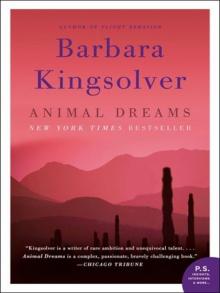 Animal Dreams: A Novel
Animal Dreams: A Novel The Poisonwood Bible
The Poisonwood Bible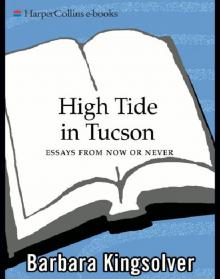 High Tide in Tucson
High Tide in Tucson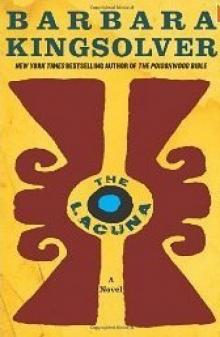 The Lacuna
The Lacuna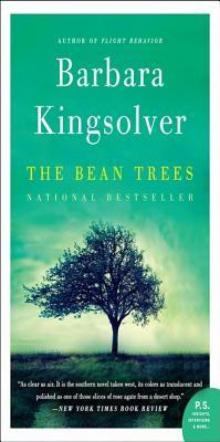 The Bean Trees
The Bean Trees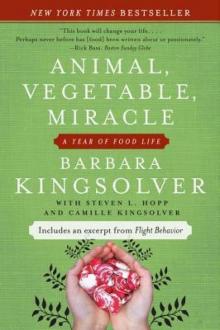 Animal, Vegetable, Miracle: A Year of Food Life
Animal, Vegetable, Miracle: A Year of Food Life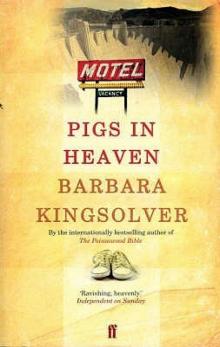 Pigs in Heaven
Pigs in Heaven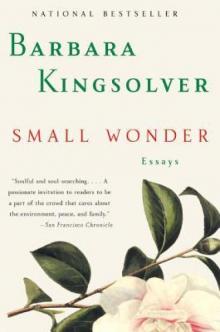 Small Wonder
Small Wonder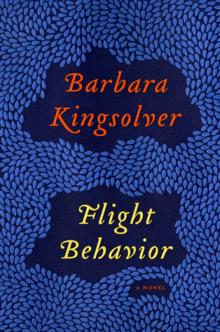 Flight Behavior
Flight Behavior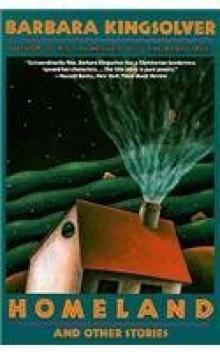 Homeland and Other Stories
Homeland and Other Stories How to Fly (In Ten Thousand Easy Lessons)
How to Fly (In Ten Thousand Easy Lessons) Unsheltered
Unsheltered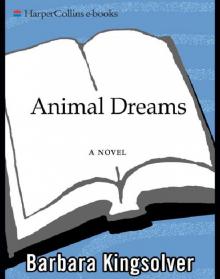 Animal Dreams
Animal Dreams Prodigal Summer
Prodigal Summer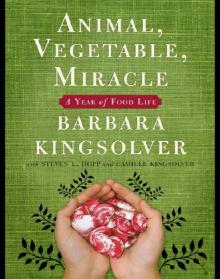 Animal, Vegetable, Miracle
Animal, Vegetable, Miracle